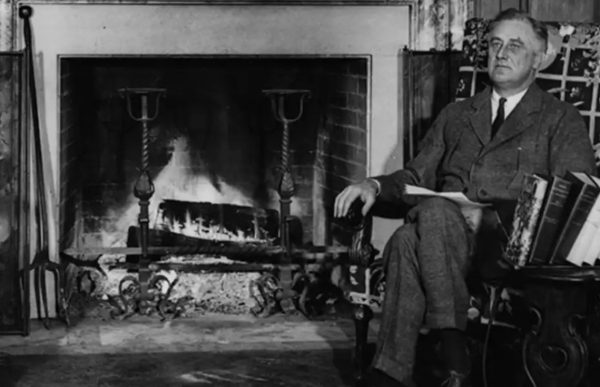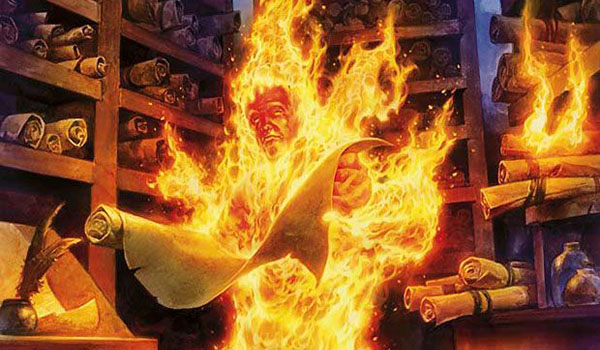Are you a Quiet Speculation member?
If not, now is a perfect time to join up! Our powerful tools, breaking-news analysis, and exclusive Discord channel will make sure you stay up to date and ahead of the curve.
At the end of 2022, Wizards held a "Fireside Chat" to answer pressing questions in a climate of growing unease about the future of Magic. The data and viewpoints expressed during the segment are of particular interest to us as we head into what already looks to be another product-packed year.
For those who aren't versed in US history, the "Fireside Chat" was pioneered by President Franklin Delano Roosevelt (FDR) shortly after he entered office. The world was in a very precarious place. WWI had ended, but there remained plenty of bad blood in Europe between the victors and the vanquished. Then, in 1929, the Great Depression occurred after the stock market collapsed. Thus, FDR began a series of radio speeches dubbed "Fireside Chats" which were meant to calm people down and provide some sense of hope in desperate times.

While Wizards of the Coast is far from presidential, I understand the reasoning behind their decision to address shareholders and the public in general after being downgraded by a Bank of America analyst in November. Hasbro, the parent company of Wizards of the Coast, stock saw a significant dip after the downgrade. Given that most of the analysts concerns were with Magic the Gathering specifically, these concerns needed to be addressed. I do applaud Wizards of the Coast for addressing these concerns in a timely manner and in a way that the general public was able to access.
Facts from Wizards of the Coast Employees
We don't often get to see behind the curtain with regards to a lot of the data that Wizards of the Coast collects, so this was a nice opportunity to hear straight from them. What follows is a list of key facts shared during the chat and some analysis of each.
- There are 60 million players worldwide.
- 50 million players are estimated to be currently playing.
- Magic is on pace to be Hasbro's first billion-dollar brand.
Given these numbers, I am actually surprised Magic hasn't already reached the billion-brand mark, as doing so would only require those 50 million players to spend an average of $20 a year each.
- The average Magic player is 30 years old.
- The casual player base makes up an estimated 80% of the total playerbase.
- Over 50% of players identify as "social players."
- Around 50% of players are also collectors of some kind.
Wizards of the Coast claims about 80% of the playerbase is casual, which means 40 million of those players are casual. I do find this number a bit suspect though, as casual players would be very difficult to track. Competitive players register for events and thus are easy to quantify.
But what makes a player casual? I am curious what metrics are used to create this estimation. I know that most of my playgroup hasn't played in any sanctioned event since pre-Covid, and doesn't tend to buy any sealed product; in our own eyes, we have gone from competitive to casual players during the past few years.
- 33% of players have less than three years experience.
- 33% of players have ten or more years experience.
If 33% of players have played for 3 years or less, Magic must have grown a great deal during the pandemic, which makes sense as most other forms of entertainment were unavailable. However, given that during that same pandemic a lot of game stores were closed, I question if a lot of that growth is specifically on Arena. If it is, that makes the brand growth for Magic even more impressive, as one doesn't need to spend any real money on Arena to develop a decent collection thanks to all the rewards.
- There are 10 million registered digital players on Arena.
- "Hybrid players" (those who play both digitally and tabletop) spend 40% more money than other players.
In fact, I would argue that in regards to Arena, you can choose to sacrifice either money or time in order to build your digital collection. Given many had a lot more free time for the past few years, that is likely the most common route taken. I do wonder if some of these numbers are taken from actual surveys sent out by Wizards of the Coast. If so, there can be inherent flaws in the data collection, as many businesses that specialize in that sort of data collection will tell you.
- Magic saw 350-400 million dollars in sales in 2016. They have tripled this business since then by producing casual/collectors products.
- Wizards of the Coast has a goal to generate 250-300 million in cost savings and are currently on pace to meet or exceed this goal.
I spent 9 months working as a value engineer, and I have a good understanding of some basic material costs; cardboard is an extremely cheap material. Cost-cutting is typically divided into two realms: material costs and manufacturing costs.
When your material costs are trivial, you are forced to look mainly at manufacturing costs. If we look at the dirge of defects we have seen from recent product lines, it isn't surprising to learn that Wizards if the Coast has been cutting costs by drastically reducing quality.
Some More Comments from Wizards of the Coast
In-store play is trending upward and is currently at 75% of pre-pandemic numbers.
While this certainly sounds good and shows a positive outlook on the future, I think it's important to keep in mind that when this statement was made, no states had lock downs and all businesses that wanted to be open were able to be. This is an important point to make as it actually implies that while in-store play may be trending back to the status quo, it is still down 25% despite all the growth Wizards of the Coast is seeing. This means that there is still a significant lack of in-store play, indicating that competitive staples are likely going to remain depressed for some time.
The core sales channel for business is through LGSs.
This statement, which was given alongside a rough 70% estimate for said sales, implies that Wizards of the Coast still relies heavily on local game stores for their sales and thus profits. This is especially interesting given that there are numerous reports of LGSs going out of business or being first to diversify their offerings in order to remain open. While anecdotal, my own favorite LGS went from being almost exclusively Magic to now being maybe 25% Magic. According to the owner, the change was due to Magic profits drying up.
More than 80% of stores claim they are growing or equal to last year.
The way this is worded is a little open-ended, and I don't know if that's on purpose or accidental. Are LGSs growing because of Magic, or in spite of it? The reason this is so important is that as previously mentioned, Wizards relies on LGSs for 70% of their business. If those same LGSs believe their money is better spent on other games, then Wizards could be in a lot of trouble.
We don't participate in the secondary market for products.
This is obviously not true. It was true, until the Secret Lair product line began. I am sure that their belief is that because you aren't buying a single card in any given Secret Lair, but a small number of cards, they aren't "singles," but that seems disingenuous at best. The Bitterblossom Dreams release literally included one copy of Bitterblossom and 4x Faerie Rogue tokens.
Dowsing the Fire
I appreciate Wizards providing us with some great information and their desire to help calm concerns from many players. Unfortunately, after listening to the whole chat, I received little comfort from Wizards as both a player and an online store. They continue to believe that their deluge of new products has no ramifications for the game and simply provides a nice boost to their profit numbers.
I happen to disagree; two notable effects of their current strategy seem to be the erosion of local game support and the weakening of collector confidence. These factors could lead to Magic being less played over other games, and less product being purchased overall.
I will likely delve more into these effects in a future article, but until then, I hope everyone had a wonderful holiday break and I look forward to seeing what 2023 has in store for us.





Magic seems to have been overshadowed by other popular games, but it remains the top professional circuit out there. It’s not as visible as it used to be as the market switches to online gaming. Magic currently ranks third among the most popular games online going neck on neck with Yu-Gi-Oh with almost a millions streaming views a week. That’s still pretty solid.